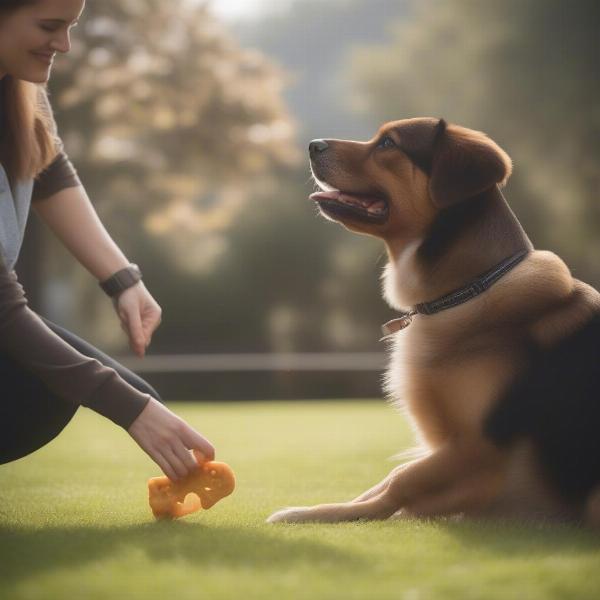Scooby Snacks are synonymous with rewarding good behavior, especially in the canine world. But are these fictional treats a healthy and effective option for your real-life furry friend? This article dives into the world of Scooby Snacks for dogs, exploring what they are, the benefits and drawbacks of using treats as rewards, and providing you with practical tips for choosing healthy and effective treats for your dog.
What Exactly Are “Scooby Snacks” for Dogs?
While the actual Scooby Snacks from the cartoon aren’t available in stores (sadly!), the term has become a colloquial way to refer to any dog treat used for training and rewarding good behavior. “Scooby Snacks” can encompass a wide variety of treats, from commercially produced biscuits and chews to homemade goodies and even healthy fruits and vegetables. The key is to choose a treat your dog finds motivating and that aligns with their dietary needs and health requirements.
The Power of Positive Reinforcement: Why Treats Work
Treats are a powerful tool in positive reinforcement training. They provide immediate gratification for desired behaviors, making it easier for your dog to understand what you’re asking of them. Whether you’re teaching basic commands like “sit” and “stay” or working on more complex behaviors, treats can help accelerate the learning process and strengthen the bond between you and your pet.
 Dog Training with Positive Reinforcement and Treats
Dog Training with Positive Reinforcement and Treats
Choosing the Right “Scooby Snack”: Factors to Consider
Not all treats are created equal. When choosing a “Scooby Snack” for your dog, consider the following factors:
- Ingredients: Look for treats made with high-quality, natural ingredients. Avoid artificial colors, flavors, and preservatives.
- Size and Texture: Choose treats that are appropriately sized for your dog. Smaller dogs may need smaller treats to avoid overeating. Consider your dog’s chewing habits – a gulper might need a softer treat, while a power chewer might benefit from a more durable option.
- Calorie Content: Treats should be a small part of your dog’s overall diet. Opt for lower-calorie options, especially if your dog is overweight or prone to weight gain.
- Allergies and Sensitivities: If your dog has any known allergies or sensitivities, choose treats that are free of those ingredients.
- Dental Health: Some treats can help clean your dog’s teeth and freshen their breath.
Making Your Own “Scooby Snacks”: Healthy Homemade Treats
Making your own dog treats can be a fun and rewarding experience. It allows you to control the ingredients and tailor the recipe to your dog’s specific needs. Simple recipes using ingredients like sweet potato, peanut butter (xylitol-free!), and oats can be whipped up in minutes.
Beyond Scooby Snacks: Other Forms of Positive Reinforcement
While treats are a valuable training tool, they shouldn’t be the only form of positive reinforcement you use. Praise, petting, and playtime can also be highly effective rewards for your dog. Varying your rewards can keep your dog engaged and motivated.
Conclusion: Finding the Perfect “Scooby Snack” for Your Dog
Choosing the right “Scooby Snack” is essential for effective training and a happy, healthy dog. By considering factors like ingredients, size, and calorie content, you can find treats that your dog loves and that support their overall well-being. Whether you choose commercially produced treats or opt for the homemade route, remember that “Scooby Snacks” are a fun and rewarding way to strengthen your bond with your furry friend.
FAQ:
- Are human snacks safe for dogs? Many human foods are toxic to dogs, such as chocolate, grapes, and onions. Always check the safety of a food before giving it to your dog.
- How many treats should I give my dog per day? Treats should not make up more than 10% of your dog’s daily calorie intake.
- Can I use treats for training an older dog? Yes! Treats are effective for training dogs of all ages.
- What if my dog isn’t motivated by treats? Try different types of treats or other rewards like praise or toys.
- Are grain-free treats better for my dog? Not necessarily. Some dogs thrive on grain-free diets, while others do not. Consult with your veterinarian.
- Can I give my dog treats if they are overweight? Choose low-calorie treats and adjust their meal portions accordingly.
- Are dental chews considered treats? Yes, dental chews can be considered treats and can contribute to your dog’s dental health.
ILM Dog is a leading international website dedicated to providing dog owners with expert advice and resources on all aspects of dog care. We offer comprehensive information on dog breeds, health, training, nutrition, grooming, and much more. Our goal is to help you provide the best possible care for your canine companion. For personalized guidance and expert recommendations, contact us at [email protected] or call us at +44 20-3965-8624. ILM Dog is your trusted source for all things dog!